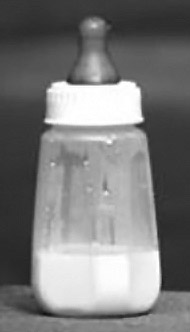It’s normal for babies to spit up from time to time, and to have occasional digestive discomfort that can prompt more fussing or regurgitation; however, if a baby continues to have discomfort, or symptoms worsen to breathing problems or further pain, there may be an underlying problem at play. One of the underlying conditions that can cause discomfort in infants is gastro-esophageal reflux. Gastro- esphoageal reflux can present itself as a result of a few factors, such as a breast feeding mother’s diet, or ingredients in formula. Continue reading to learn more about gastro-esphoageal reflux: the symptoms, the causes, when to seek further medical advice, and what you can do to help ease your baby’s discomfort.
Gastro-esophageal reflux occurs when the contents of the stomach moves backwards, up into the esophagus and can cause quite a bit of discomfort as contents carries stomach acid along with it. Babies with reflux have mild symptoms such as posseting and regurgitation, to more severe symptoms like projectile vomiting. It is common for babies to do this occasionally. Their small stomach is easily distended during feeds and their lower esophageal sphincter (the circular, constricting muscle between the stomach and esophagus) is still maturing. This maturation is typically done by about 4-5 months but can take up to 1 year.
When symptoms occur frequently or the reflux starts causing further problems, such as discomfort, pain, breathing problems (gagging, coughing, chocking, and wheezing) or slow growth, it is important to have your baby evaluated for Gastro-Esophageal Reflux Disease (GERD). Even though frequent posseting is common for many babies, it is worthwhile to explore some of the dietary options below.
Breastfed Babies
Breastfed babies can experience GERD or colic from something in their mother’s diet. This is quite common, and a first place to turn for a natural approach. If you are breastfeeding, try cutting out certain foods for a few weeks and see if that makes a difference. There is quite a large list of aggravating foods, so if you eat them all you can either test the removal of one at a time or remove them all and add one food back to your diet at a time. Keep in mind there’s a different threshold of tolerance for each baby to each food.
For example: if you were eating lots of cruciferous vegetables (broccoli, brussel sprouts, cauliflower, etc), removed them and found a decrease in GERD symptoms, it doesn’t necessarily mean you cannot have any. Some foods may be tolerated in small amounts, like garlic and cruciferous veggies, while other foods may produce symptoms with ingestion of small amounts, as is common with dairy or wheat. Remember, GERD is just one expression of food sensitivity; there are many symptoms that babies can express from food sensitivities. It is a good idea to speak with a Naturopathic Doctor about this prior to and during the experimentation phase in case you are misunderstanding or missing other important symptoms.
Aggravating Foods (in order of how common they are)
- Dairy
- Eggs
- Chili or spicy foods
- Wheat
- Caffeine
- Sulphur containing vegetables (ex: garlic, onions, brussel sprouts, broccoli, cabbage)
- Alcohol
- Food additives or preservatives
- Soy
- Mint
Bottle-Fed Babies
Bottle-fed babies experience GERD as well. Most formulas are cow’s-milk-based, so experimenting with different formulas is the best next step. There are a number of dairy free formulas available, but some of the common alternatives are filled with a number of highly processed GMO foods that can be just as difficult to digest. A Naturopathic Doctor can  help you decide which dairy free formula is best to suit your baby’s specific needs.
help you decide which dairy free formula is best to suit your baby’s specific needs.
In addition to diet, factors such as: breastfeeding positioning, frequency of feeds, avoidance of pressure on the abdomen after feeds, burping and so on are important to consider.
These techniques can also be supported with a few minor supplements and herbs such as probiotics and carminative herbs. Carminative herbs such as a weak dilution of crushed fennel seeds and chamomile leaves in warm water can be very helpful for a gassy, fussy baby. Slippery elm powder mixed in cool water or marshmallow root infused overnight is great for soothing the esophagus after GERD episodes as it coats and soothes the irritated tissue. Mixing slippery elm powder with water and a bit of maple syrup or pure apple juice makes a soothing porridge for baby.
When introducing probiotics, slow and steady is key, use a smaller dose initially and work your way up to the full dose for their age.
I hope this has been informative. If you would like help with any of this, or you suspect your baby might be struggling with GERD, you might consider booking an appointment with me.
